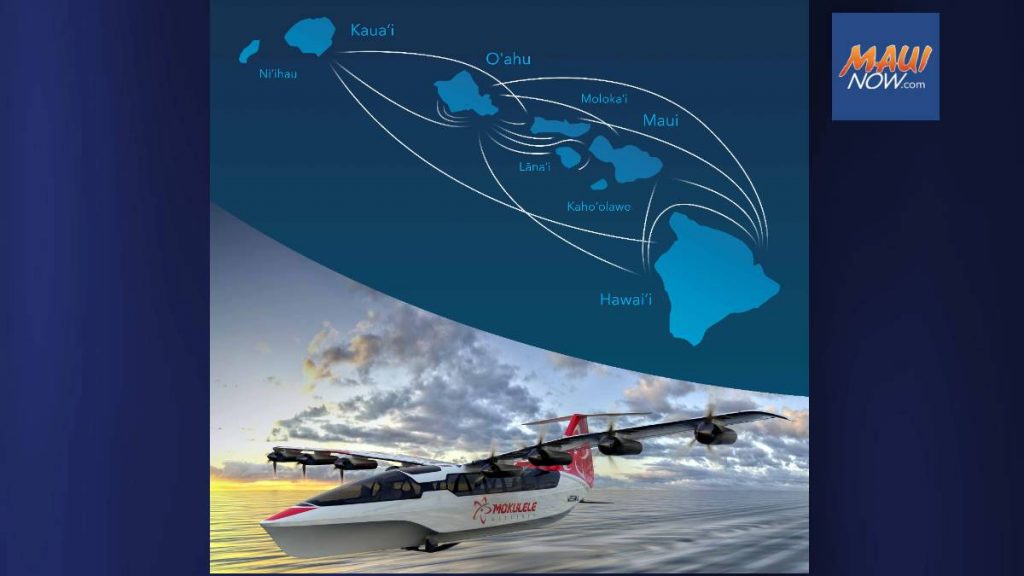Electric seaglider network for people and freight being explored in Hawai’i

REGENT, the company behind the all-electric seaglider, is partnering with Mokulele Airlines and Pacific Current to explore the build-out of a seaglider transportation network for passengers and freight in the State of Hawai‘i.
The goal is to drive innovation to support of a more resilient and sustainable transportation ecosystem for the state.
Pacific Current, a subsidiary of Hawaiian Electric Industries, is the project’s energy and infrastructure partner for Hawai’i. The company will focus on vehicle financing and developing and providing access to renewable energy and electric charging infrastructure.
Mokulele Airlines, a Southern Airways Company, will be the launch partner for the seaglider transportation network that plans to bring a fleet of REGENT’s 12-passenger Viceroy seagliders to the island chain.
“The REGENT seaglider is a complete game changer for the State of Hawai’i,” said Stan Little, CEO of Mokulele. “Not only can this vehicle help the state meet its sustainability and resiliency goals more quickly, but this will enable our airline to offer new services that aren’t possible today.”
Little said the seaglider network will provide the ability to stand up a fast, convenient affordable transportation solution with passengers not having to go an airport.
“Just imagine going from Kona Harbor to downtown Honolulu in less than 55 minutes door to door,” he said. “The partnership between REGENT and Pacific Current allows us to do what we do best, and that is to provide local communities across the state with safe, convenient transportation for their leisure, business and medical travel needs.”
Billy Thalheimer, CEO and co-founder of REGENT, said in a press release that his company is committed to helping Hawai’i move toward a sustainable transportation future.
“The very first step is to listen and learn what the community cares about,” Thalheimer said. “The response from the community has been overwhelmingly positive and the opportunity to build a seaglider network for Hawai‘i is a dream come true. We’re thrilled to help push the boundaries of innovation in clean transportation for the state.”
Thalheimer said his company recognizes that Hawai‘i is a special place, with a sacred culture, sensitive environmental ecosystems and unrivaled biodiversity.
“The feasibility study continues our commitment to engage with local communities, civic organizations, and all appropriate private and public sector leaders to understand how seagliders can help improve the daily lives of the residents,” he said. ” We are excited and humbled to be a part of this team accelerating Hawai’i’s push toward a zero-emission future.”
REGENT first embarked on its community listening tour in the summer of 2021. Key members of the REGENT management team have spent almost a full year engaging with stakeholders across the public, private and civic sectors to understand the needs of the residents, learn more about the unique ecosystems associated with the region, and help state officials think through Hawai’i’s sustainability and resiliency goals.
SMS Research, a Honolulu-based market research firm, will look at the economic, environmental and community benefits and challenges associated with introducing seagliders to Hawai’i.
The study focuses on the economic impact to the state as well as how seagliders can help advance affordability and accessibility of transportation, including assessing the impact of adding new routes and services to improve access for underserved communities.
The study also will include a detailed analysis of various ports and harbors led by EKNA Services, a Honolulu-based engineering and construction management firm.
According to the REGENT press release, local operators providing cargo, passenger and emergency services to Hawai’i will be able to easily transition to a new, sustainable form of transportation without having to spend large amounts of capital to get a new service up and running.
Local operators also will have access to vehicle leasing and financing solutions from Pacific Current as well as dock and charging infrastructure that will map to important inter- and intra-island commercial routes.
REGENT and Pacific Current have already begun engaging key community, environmental, private and public sector stakeholders across the state to make this vision a reality in a way that prioritizes and respects Hawai’i’s culture and unique environment.
“Joining forces with REGENT represents a huge opportunity for Pacific Current and HEI to significantly increase our clean energy and clean transportation impact,” said Scott Valentino, president of Pacific Current. “The upfront capital costs associated with a transition of this magnitude are immense and often this is a gating factor for wider adoption.
“We hope to enable local service providers in passenger, freight and emergency services lower the price of passenger travel, and the costs of moving goods and services throughout the state.”
Scott Glenn, Chief Energy Officer for the State of Hawai‘i, said in the press release: “Reducing the carbon footprint of aviation is integral to achieving our state’s renewable energy goals and we appreciate that REGENT is working with communities on this effort.”
Kuhio Lewis, Chief Executive Officer for the Council for Native Hawaiian Advancement, also expressed support for the study and the company’s collaborative efforts with the community.







